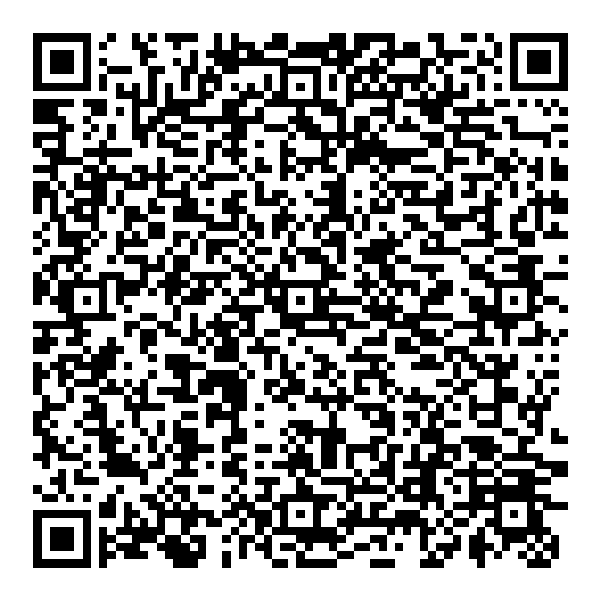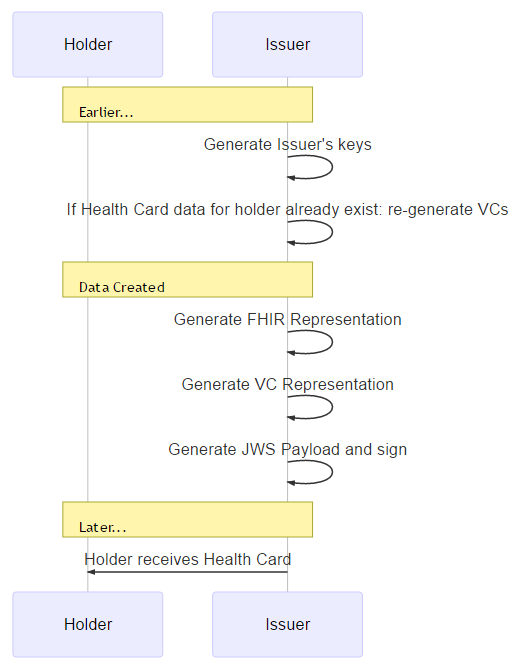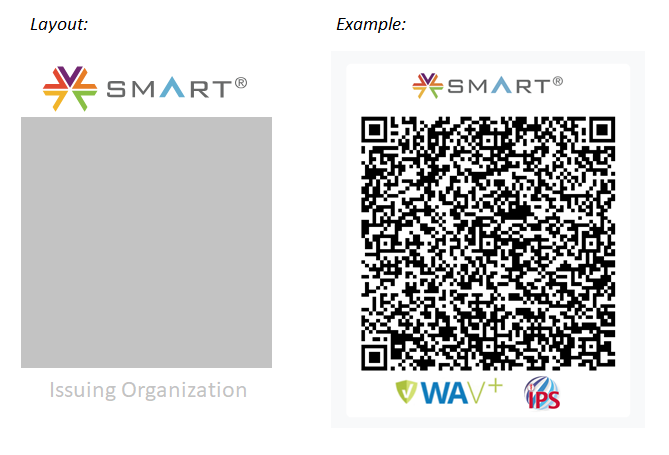
Links: Table of Contents | QA Report | Version History |
 |
Propose a change
|
Propose a change
credentialValueSet
. Restricts the request by FHIR
content such as "any standardized vaccine code for mpox".
Any ValueSet MAY be used, but consider using ValueSets that are openly accessible in FHIR format to maximize the chance that the issuing server will be able to be recognize them. Examples of such ValueSets can be found at Health Card ValueSets
.
ValueSet-based filters apply to the FHIR Resources within the Health Card
payload at .vc.credentialSubject.fhirBundle.entry[].resource
. For
Immunizations, the Immunization.vaccineCode
is evaluated. For Observations,
the Observation.code
is evaluated. Multiple credentialValueSet
parameters
in one request SHALL be interpreted as a request for credentials with content
from all of the supplied ValueSets (logical AND).
<<iss value from JWS>>
+ /.well-known/jwks.json
, with Cross-Origin Resource Sharing (CORS)
enabled, using TLS version 1.2 following the IETF BCP 195
recommendations or TLS version 1.3 (with any configuration).
<<iss value from JWS>>
+ /.well-known/jwks.json
, with Cross-Origin Resource Sharing (CORS)
enabled, using TLS version 1.2 following the IETF BCP 195
recommendations or TLS version 1.3 (with any configuration).
type
, and credentialSubject
properties are added to the vc
claim of the JWT. The type
values are defined in Credential Types
; the https://smarthealth.cards#health-card
SHALL be present; other types SHOULD be included when they apply. Verifiers and other entities processing SMART Health Cards SHALL ignore any additional type
elements they do not understand. The issuer
property is represented by the registered JWT iss
claim and the issuanceDate
property is represented by the registered JWT nbf
("not before") claim (encoded as the number of seconds from 1970-01-01T00:00:00Z UTC, as specified by RFC7519
). Hence, the overall JWS payload matches the following structure (before it is minified and compressed
):
.vc.credentialSubject.fhirBundle.entry[].resource
. For
Immunizations, the Immunization.vaccineCode
is evaluated. For
Observations, the Observation.code
is evaluated.
DEPRECATED
Chunking Larger SMART Health Cards
Deprecation note: As of December 2022, support for chunking has not been widely adopted in production SHC deployments. For SHCs that need to be presented as QRs, we recommend limiting payload size to fit in a single QR (when possible), or else considering SMART Health Links. Commonly, SMART Health Cards will fit in a single V22 QR code. Any JWS longer than 1195 characters SHALL be split into "chunks" of length 1191 or smaller; each chunk SHALL be encoded as a separate QR code of V22 or lower, to ensure ease of scanning. Each chunk SHALL be numerically encoded and prefixed with an ordinal as well as the total number of chunks required to re-assemble the JWS, as described below. The QR code FAQ page details max JWS length restrictions at various error correction levels. To ensure the best user experience when producing and consuming multiple QR codes:
- Producers of QR codes SHOULD balance the sizes of chunks. For example, if a JWS is 1200 characters long, producers should create two ~600 character chunks rather than a 1191 character chunk and a 9 character chunk.
- Consumers of QR codes SHOULD allow for scanning the multiple QR codes in any order. Once the full set is scanned, the JWS can be assembled and validated.
shc:/
) always has 20 header bits and 40 data bits for a total of 60 bits.
1
location
(SHALL be present if no embedded
content is included): URL to the file. This URL SHALL be short-lived and intended for single use. For example, it could be a short-lifetime signed URL to a file hosted in a cloud storage service (see signed URL docs for S3
, Azure
, and GCP
).
location
(SHALL be present if no embedded
content is included): URL to the file. This URL SHALL be short-lived and intended for single use. For example, it could be a short-lifetime signed URL to a file hosted in a cloud storage service (see signed URL docs for S3
, Azure
, and GCP
).
location
(SHALL be present if no embedded
content is included): URL to the file. This URL SHALL be short-lived and intended for single use. For example, it could be a short-lifetime signed URL to a file hosted in a cloud storage service (see signed URL docs for S3
, Azure
, and GCP
).
L
flag for long-term use, the client MAY
periodically poll for changes in the manifest. The server MAY provide a
Retry-After
header on successful manifest responses, indicating the minimum time that the
client SHOULD wait before its next polling request. If manifest requests are
issued too frequently, the server MAY respond with HTTP status 429 Too Many
Requests
and a Retry-After
header indicating the minimum time that a client
SHALL wait before re-issuing a manifest request.




